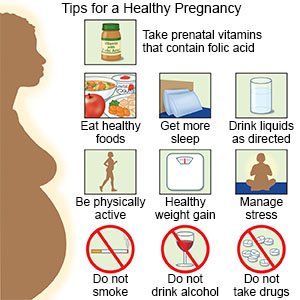Pregnancy at 7 to 10 Weeks
Medically reviewed by Drugs.com. Last updated on Aug 4, 2025.
What changes are happening with my body?
Pregnancy hormones may cause your body to go through many changes during this stage of your pregnancy. You may feel more tired than usual, and have mood swings, nausea and vomiting, and headaches. You may gain or lose some weight. Your breasts may feel tender and swollen and you may urinate more often. You may have cravings for certain foods or dislike of foods you normally eat. You may also have heartburn or constipation.
How do I care for myself at this stage of my pregnancy?
 |
- Manage nausea and vomiting. Avoid fatty and spicy foods. Eat small meals throughout the day instead of large meals. Ginger may help to decrease nausea. Ask your healthcare provider about other ways of decreasing nausea and vomiting.
- Eat a variety of healthy foods. Healthy foods include fruits, vegetables, whole-grain breads, low-fat dairy foods, beans, lean meats, and fish. Drink liquids as directed. Ask how much liquid to drink each day and which liquids are best for you. Limit caffeine to less than 200 milligrams each day. Limit your intake of fish to 2 servings each week. Choose fish low in mercury such as canned light tuna, shrimp, salmon, cod, or tilapia. Do not eat fish high in mercury such as swordfish, tilefish, king mackerel, and shark.

- Take prenatal vitamins as directed. Prenatal vitamins provide some of the extra vitamins and minerals you need during pregnancy. The vitamins will contain 400 to 800 micrograms (mcg) of folic acid to help prevent certain conditions, such as spina bifida. You may have started taking prenatal vitamins or folic acid supplements 1 month or more before you became pregnant. Continue taking them through the first 2 to 3 months (8 to 12 weeks) of pregnancy.

- Ask how much weight you should gain each month. Too much or too little weight gain can be unhealthy for you and your baby.
- Talk to your healthcare provider about exercise. Moderate exercise can help you stay fit. Your healthcare provider will help you plan an exercise program that is safe for you during pregnancy.

- Do not smoke. Smoking increases your risk of a miscarriage and other health problems during your pregnancy. Smoking can cause your baby to be born too early or weigh less at birth. Quit smoking as soon as you think you might be pregnant. Ask your healthcare provider for information if you need help quitting.
- Do not drink alcohol. Alcohol passes from your body to your baby through the placenta. It can affect your baby's brain development and cause fetal alcohol syndrome (FAS). FAS is a group of conditions that causes mental, behavior, and growth problems.
- Talk to your healthcare provider before you take any medicines. Many medicines may harm your baby if you take them when you are pregnant. Do not take any medicines, vitamins, herbs, or supplements without first talking to your healthcare provider. Never use illegal or street drugs (such as marijuana or cocaine) while you are pregnant.
What are some safety tips during pregnancy?
- Avoid hot tubs and saunas. Do not use a hot tub or sauna while you are pregnant, especially during your first trimester. Hot tubs and saunas may raise your baby's temperature and increase the risk of birth defects.
- Avoid toxoplasmosis. This is an infection caused by eating raw meat or being around infected cat feces. It can cause birth defects, miscarriages, and other problems. Wash your hands after you touch raw meat. Make sure any meat is well-cooked before you eat it. Avoid raw eggs and unpasteurized milk. Use gloves or ask someone else to clean your cat's litter box while you are pregnant.
Related medications
What changes are happening with my baby?
By 10 weeks, your baby will be about 2½ inches long from the top of the head to the rump (baby's bottom). Your baby weighs about ½ ounce. Major body organs, such as the brain, heart, and lungs, are forming. Your baby's facial features are also starting to form.
What do I need to know about prenatal care?
Prenatal care is a series of visits with your healthcare provider throughout your pregnancy. During the first 28 weeks of your pregnancy, you will see your healthcare provider 1 time each month. Prenatal care can help prevent problems during pregnancy and childbirth. Your healthcare provider will check your blood pressure and weight. Your baby's heart rate will also be checked. You may also need the following at some visits:
- A pelvic exam allows your healthcare provider to see your cervix (the bottom part of your uterus). Your healthcare provider will use a speculum to open your vagina. He or she will check the size and shape of your uterus. You may also have a Pap smear at your first prenatal visit. This is a test to check your cervix for abnormal cells.
- Blood tests may be done to check for any of the following:
- Gestational diabetes or anemia (low iron level)
- Blood type or Rh factor, or certain birth defects
- Immunity to certain diseases, such as chickenpox or rubella
- An infection, such as a sexually transmitted infection, HIV, or hepatitis B
- Hepatitis B may need to be prevented or treated. Hepatitis B is inflammation of the liver caused by the hepatitis B virus (HBV). HBV can spread from a mother to her baby during delivery. You will be checked for HBV as early as possible in the first trimester of each pregnancy. You need the test even if you received the hepatitis B vaccine or were tested before. You may need to have an HBV infection treated before you give birth.
- Urine tests may also be done to check for sugar and protein. These can be signs of gestational diabetes or preeclampsia. Urine tests may also be done to check for signs of infection.
- A fetal ultrasound shows pictures of your baby inside your uterus. The pictures are used to check your baby's development, movement, and position.

- Genetic disorder screening tests may be offered to you. These screening tests check your baby's risk for genetic disorders such as Down syndrome. A screening test includes a blood test and ultrasound.
When should I seek immediate care?
- You have pain or cramping in your abdomen or low back.
- You have heavy vaginal bleeding or clotting.
- You pass material that looks like tissue or large clots. Collect the material and bring it with you.
When should I call my doctor or obstetrician?
- You have light bleeding.
- You have chills or a fever.
- You have vaginal itching, burning, or pain.
- You have yellow, green, white, or foul-smelling vaginal discharge.
- You have pain or burning when you urinate, less urine than usual, or pink or bloody urine.
- You have questions or concerns about your condition or care.
Care Agreement
You have the right to help plan your care. Learn about your health condition and how it may be treated. Discuss treatment options with your healthcare providers to decide what care you want to receive. You always have the right to refuse treatment. The above information is an educational aid only. It is not intended as medical advice for individual conditions or treatments. Talk to your doctor, nurse or pharmacist before following any medical regimen to see if it is safe and effective for you.© Copyright Merative 2025 Information is for End User's use only and may not be sold, redistributed or otherwise used for commercial purposes.
Learn more about Pregnancy at 7 to 10 Weeks
Care guides
Further information
Always consult your healthcare provider to ensure the information displayed on this page applies to your personal circumstances.
